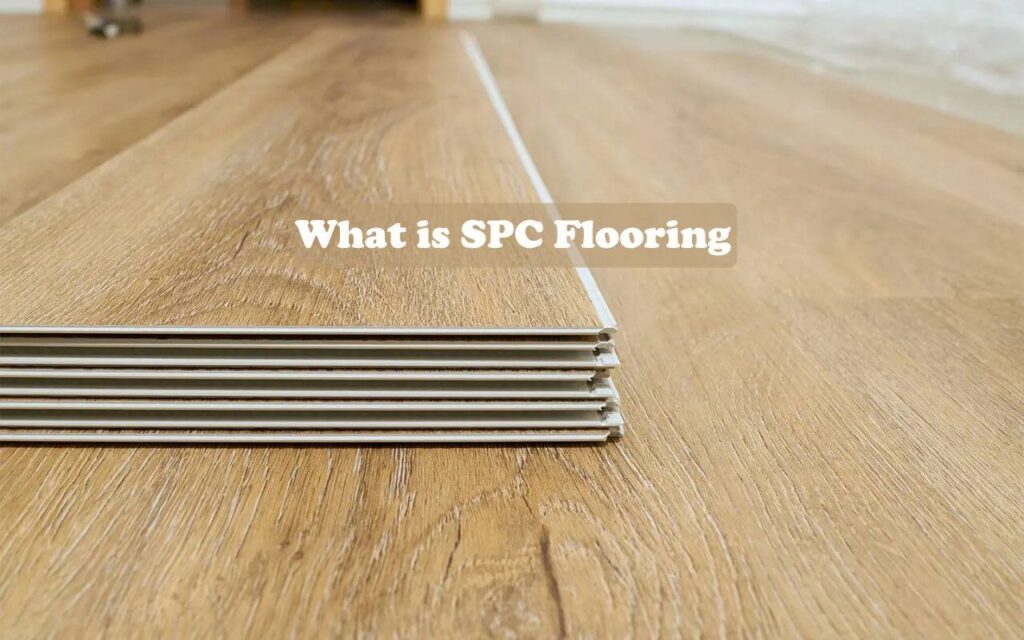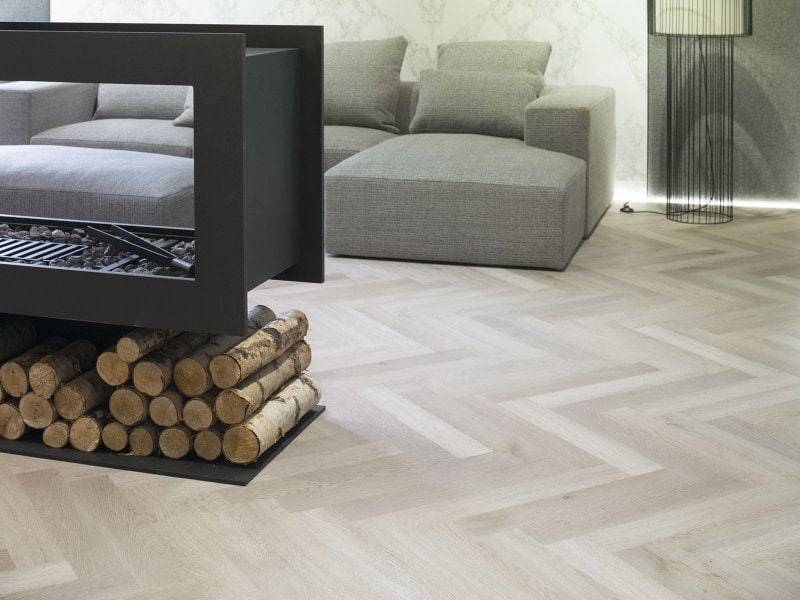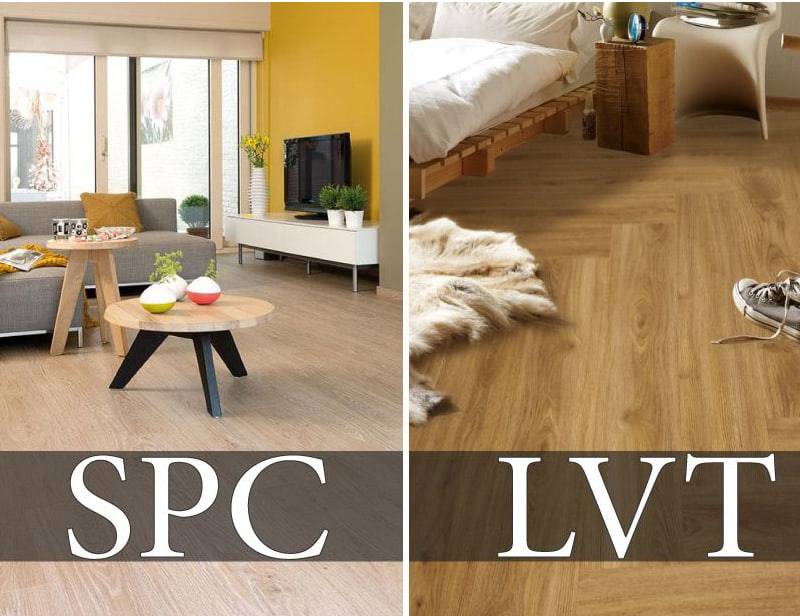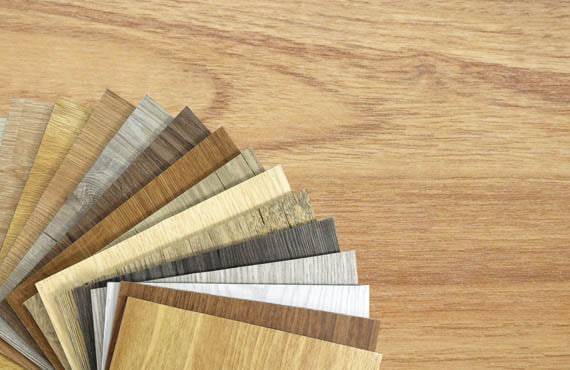Have you encountered the term “SPC flooring” lately? This abbreviation stands for Stone Polymer Composite, and it represents a cutting-edge type of rigid vinyl flooring.
Available in stunning stone, tile, or wood-like finishes, SPC flooring boasts an authentic and realistic appearance.
Its secret lies in the construction. Multiple layers, including a top layer that excels at resisting stains and scratches, come together to form this robust flooring solution.
Additionally, the base is crafted from crushed and molded stone, offering unparalleled rigidity, strength, and lasting durability.
WHY SHOULD I CHOOSE SPC FLOORING?
- Unmatched aesthetics: Enjoy the warmth and beauty of a natural wood or tile floor, replicated with stunning realism in SPC.
- Comfort underfoot: Experience a pleasantly warm and comfortable walking surface, even in areas with temperature fluctuations.
- Adaptable to imperfections: Say goodbye to extensive subfloor preparation. SPC’s rigidity can often handle slight unevenness in existing floors, allowing installation directly over some existing surfaces.
- Effortless installation: Opt for types featuring a built-in underlay for a simplified installation process.
- Climate versatility: SPC thrives in areas prone to temperature changes, making it perfect for conservatories, rooms with underfloor heating, or spaces with extensive glass features.
- Unwavering water resistance: Most SPC varieties offer complete waterproofing, ideal for moisture-prone areas like kitchens, bathrooms, and basements.
- Unrestricted installation: Unleash your design vision by installing SPC flooring in any room of your home, from high-traffic areas to cozy bedrooms.
- Effortless maintenance: Maintaining the pristine look of your SPC flooring is a breeze. Regular sweeping and cleaning is all it takes for lasting beauty.
- Budget-friendly choice: SPC offers a cost-effective alternative to genuine hardwood flooring, allowing you to achieve the desired aesthetics without breaking the bank.
The Allure and Drawbacks of SPC Flooring:
SPC flooring, or Stone Polymer Composite flooring, has emerged as a popular choice for homeowners due to its numerous advantages. However, like any material, it comes with its own set of drawbacks. Let’s delve into both sides of the coin to help you decide if SPC is the right fit for your needs.
Advantages:
- Durability and Resilience: SPC boasts exceptional resistance to scratches, dents, and wear and tear, making it ideal for high-traffic areas and pet-friendly homes.
- Waterproofing: Unlike real wood, most SPC varieties are completely waterproof, rendering them perfect for moisture-prone areas like kitchens, bathrooms, and basements.
- Ease of Installation: Many SPC options feature a click-lock system, allowing for a quick and straightforward installation process, even for DIY enthusiasts.
- Low Maintenance: Maintaining SPC flooring is a breeze. Regular sweeping and occasional mopping are sufficient to retain its pristine appearance.
- Cost-Effective: Compared to genuine wood or stone flooring, SPC offers a more affordable alternative while still achieving a realistic aesthetic.
- Versatility: SPC is available in a wide range of styles and finishes, mimicking the look of wood, tile, or stone, offering flexibility to match any design preference.
- Comfort underfoot: While its rigid core provides superior stability, some SPC options offer a comfortable walking surface, especially if paired with an underlayment.
Disadvantages:
- Hardness underfoot: Compared to carpets or other softer flooring options, SPC can feel somewhat hard underfoot, which might be a concern for some users.
- Limited Repairability: Unlike natural wood, damaged SPC planks cannot be refinished. In case of significant damage, individual planks may need to be replaced.
- Potential for VOC emissions: Some low-quality SPC options might emit volatile organic compounds (VOCs) during installation and initial stages of use. Choosing certified and reputable brands can help mitigate this concern.
- Environmental impact: While generally considered more sustainable than some traditional flooring options, the manufacturing process of SPC can still have an environmental impact.
SPC vs. LVT: Understanding the Key Differences
While both SPC (Stone Polymer Composite) and LVT (Luxury Vinyl Tile) are popular flooring options, they hold distinct characteristics that might sway your decision.
Density and Durability:
- SPC: Boasts superior density due to its stone-plastic composite core, resulting in greater impact resistance and reduced expansion/contraction under fluctuating temperatures.
- LVT: Offers a less dense core, making it more susceptible to dents and potential warping in extreme temperatures.
Waterproof Performance:
- SPC: Provides 100% waterproof protection, ideal for moisture-prone areas like kitchens, bathrooms, and basements.
- LVT: While generally water-resistant, some varieties may not be completely waterproof, limiting their suitability in certain environments.
Appearance and Suitability:
- SPC: Delivers realistic wood or stone aesthetics and can withstand higher levels of moisture, heat, and foot traffic, making it suitable for various spaces.
- LVT: Offers a wide range of styles but might encounter limitations in areas with extreme temperatures or moisture.
Installation and Maintenance:
Both SPC and LVT are generally known for their ease of installation and low-maintenance requirements. However, specific options within each category might offer slight variations.
What types of SPC flooring are there?
SPC flooring offers a wealth of options to cater to your unique style and project needs. Explore the exciting possibilities:
Plank Styles:
- Classic Wood Effect: Achieve the timeless charm of real wood flooring with planks available in a variety of finishes, from warm oaks to deep mahoganies and contemporary greys.
- Herringbone Pattern: Add a touch of sophistication with the traditional herringbone layout, perfect for creating visual interest and a sense of spaciousness.
Installation Ease:
- Click-Lock System: Experience a seamless installation process thanks to the convenient click-lock system, making SPC a great choice for DIY enthusiasts and first-time flooring projects.
Realistic Textures:
- Embossed-in-Register (EIR): Immerse yourself in the beauty of authentic wood grains recreated with stunning realism through EIR technology. This technique enhances the visual and tactile experience, further blurring the lines between real wood and SPC.
Unmatched Versatility:
- Color Spectrum: Discover a color palette that complements any interior design scheme. From classic oak tones to deep, rich shades and modern greys, SPC offers something for everyone.
- Room-to-Room Flow: The remarkable water resistance and durability of SPC allow you to extend the same flooring throughout your home, creating a seamless and cohesive feel across open-plan layouts, including bathrooms and living spaces.
Expert Guidance:
For further assistance in choosing the ideal SPC flooring for your project, reach out to our friendly team, Dex Flooring. They can provide expert advice, send you complimentary samples for in-home evaluation, and ensure you find the perfect solution for your needs.
Conclusion
SPC flooring presents a compelling option for homeowners seeking a stylish, durable, and versatile flooring solution. Its numerous advantages, including exceptional water resistance, easy installation, and budget-friendly pricing, make it a strong contender for various spaces. While some drawbacks exist, such as potential hardness underfoot and limited repairability, understanding these limitations allows you to make an informed decision that aligns with your needs and preferences.
FAQs
Is SPC flooring easy to install?
Yes, most SPC flooring features a convenient click-lock system, allowing for a quick and straightforward installation process, even for DIY enthusiasts.
Is SPC flooring waterproof?
Most SPC varieties boast complete waterproof protection, making them ideal for moisture-prone areas like kitchens, bathrooms, and basements. However, it’s always recommended to check the specific product specifications for confirmation.
How does SPC flooring compare to LVT (Luxury Vinyl Tile)?
Both offer similar benefits, but SPC generally has a denser core, making it more resistant to dents and better suited for areas with fluctuating temperatures. Additionally, SPC is often completely waterproof, while some LVT options might not be.
What types of SPC flooring are available?
SPC flooring comes in a wide range of styles, textures, and colors, mimicking the look of wood, tile, or stone. You can also find options with features like a herringbone pattern for added visual appeal.
How do I choose the right SPC flooring?
Consider factors like your desired aesthetics, budget, traffic levels, and the intended room’s usage. Additionally, explore different options and textures to find the one that best suits your style and comfort preferences.




